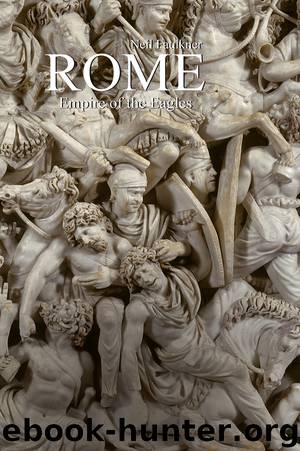Rome by Faulkner Neil

Author:Faulkner, Neil [Neil Faulkner]
Language: eng
Format: epub
ISBN: 9781317905226
Publisher: Taylor and Francis
Published: 2015-12-15T16:00:00+00:00
A new Caesar: the Second Triumvirate, 43–31 BC
The Republic was dead but not yet buried. Tim Cornell has summarized matters well: ‘With the beginning of the Civil Wars, the Republic, defined as the rule of magistrates, senate and people of Rome, was already dead. Since 60 BC control of affairs had passed from the oligarchy to the dynasts, who were supported by their private armies and clientelae, and were constitutionally provided for by special commands which freed them from the restrictions of the system of annual collegiate magistracies. The oligarchy that Sulla restored had shown itself to be irresponsible, corrupt, self-seeking and indifferent, and no longer commanded the respect or loyalty of any significant group in society. The propertied classes of Italy had no confidence in a regime which excluded their leading men from senior positions and was unable to guarantee order and stability; the poor happily surrendered their spurious freedoms and ineffectual political rights in favour of individual leaders who depended on them for support and who consequently took care to supply their material needs. The position of Pompey in the mid-50s … already fore-shadowed that of the emperors.’(20) To this I would add that the dynasts had been able to usurp power because the oligarchy’s social base had been eroded by the expansion of the empire, the rise of new classes, and the consequent dislocation of the old order of state and society – changes which had engendered a revolutionary crisis. But because the dynasts at the same time fought for themselves – for personal power within the existing system – the leadership they offered remained inchoate. For this reason there was no clear break: the end was messy and protracted, and the Republic remained a wraithlike presence now and for a century or more to come.
Pompey, for instance, was diverted from the role of reforming dictator by his rivalry with Caesar. But Cornell is surely right to see the First Triumvirate as a transitional government heralding the end of the Republic and the creation of the Principate. Until this time, Roman politics had been intermittently shaped by the intervention of warlords, but, between bouts of open war, the politicians, the Senate and the Concordia Ordinum had retained a fragile grip. Never again after 60 BC. The highest point of senatorial politics henceforward was to choose between masters. The Senate, anyway, was transformed in the civil-war generation: many of the old families, some claiming descent from noble ancestors centuries before, were consumed by battle, execution and purge; the triumvirs filled the empty seats – and more (the Senate grew from several hundred to a thousand) – with loyalist ‘new men’. An ‘aristocracy of the robe’, sitting by hereditary right, was gradually replaced by an ‘aristocracy of office’, men who had risen to the top through military and administrative service under the triumvirs.
Some men, though, could not stomach the subservience on which careers now depended. They resented the regal airs of those who had once been their peers; the
Download
This site does not store any files on its server. We only index and link to content provided by other sites. Please contact the content providers to delete copyright contents if any and email us, we'll remove relevant links or contents immediately.
| Africa | Americas |
| Arctic & Antarctica | Asia |
| Australia & Oceania | Europe |
| Middle East | Russia |
| United States | World |
| Ancient Civilizations | Military |
| Historical Study & Educational Resources |
The Daily Stoic by Holiday Ryan & Hanselman Stephen(3324)
The Fate of Rome: Climate, Disease, and the End of an Empire (The Princeton History of the Ancient World) by Kyle Harper(3067)
People of the Earth: An Introduction to World Prehistory by Dr. Brian Fagan & Nadia Durrani(2739)
Ancient Worlds by Michael Scott(2689)
Babylon's Ark by Lawrence Anthony(2679)
The Daily Stoic by Ryan Holiday & Stephen Hanselman(2579)
Foreign Devils on the Silk Road: The Search for the Lost Treasures of Central Asia by Peter Hopkirk(2465)
India's Ancient Past by R.S. Sharma(2455)
MOSES THE EGYPTIAN by Jan Assmann(2417)
The Complete Dead Sea Scrolls in English (7th Edition) (Penguin Classics) by Geza Vermes(2283)
The Earth Chronicles Handbook by Zecharia Sitchin(2231)
Lost Technologies of Ancient Egypt by Christopher Dunn(2226)
24 Hours in Ancient Rome by Philip Matyszak(2084)
Alexander the Great by Philip Freeman(2065)
Aztec by Gary Jennings(2032)
The Nine Waves of Creation by Carl Johan Calleman(1919)
Curse Tablets and Binding Spells from the Ancient World by Gager John G.;(1862)
Before Atlantis by Frank Joseph(1858)
Earthmare: The Lost Book of Wars by Cergat(1825)
